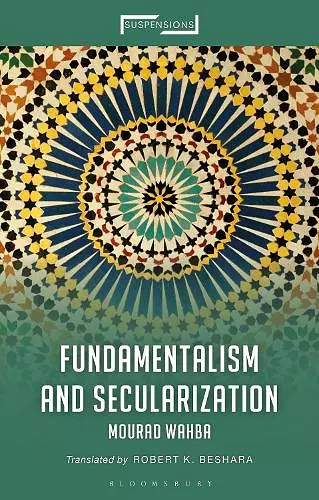Fundamentalism and Secularization
Emeritus Professor Mourad Wahba author Assistant Professor Robert K Beshara translator
Format:Paperback
Publisher:Bloomsbury Publishing PLC
Published:27th Jul '23
Currently unavailable, and unfortunately no date known when it will be back

The first English translation of Mourad Wahba's classic text, Fundamentalism and Secularization, exploring how they are inextricably linked.
In Fundamentalism and Secularization, Egyptian philosopher Mourad Wahba traces the historical origins of fundamentalism and secularization as ideas and practices in order to theorize their symbiotic relationship, and how it is impacted by global capitalism and, more recently, postmodernism.
This gives voice to an argument from within the Islamic world that is very different to that given platform in the mainstream, showing that fundamentalism does not arise normally and naturally from Islam but is a complex phenomenon linked to modernization and the development of capitalism in dependent countries, that is, tied to imperialism.
Wahba's central argument concerns the organic relationship between fundamentalism and parasitic capitalism. Wahba is equally critical of religious fundamentalism and global capitalism, which for him are obstructions to secularization and democracy. While the three Abrahamic religions are examined when it comes to fundamentalism, Wahba deconstructs Islamic fundamentalism in particular and in the process reconstructs an Islamic humanism.
Including a new preface by the author and translator, Fundamentalism and Secularism provides invaluable insights into how Middle Eastern philosophies open up new lines of thought in thinking through contemporary crises.
Beshara has rendered a great service to those interested in contemporary Arabic philosophy through his readable and accurate translation of Fundamentalism and Secularization. * Marx and Philosophy Review of Books *
Appreciation and praise to Robert K. Beshara for making Mourad Wahba’s Fundamentalism and Secularization available to Anglophone readers through this wonderful translation, with an interview and additional essays. A provocative—and in this reader’s view insightful—thesis of Wahba’s text is that postmodernism is an exemplar of fundamentalisms and their aspirations of a foreclosed and often feared future. This classic work is a testament to the value of epistemic humility, the vitality of creativity, and the courage of taking responsibility for a future to create instead of to block. Its relevance to the contemporary global social and political situation, in which fundamentalisms ranging from the parasitic capitalist forces of neoliberalism and neoconservatism alongside bizarre meetings of neofascism and left pessimism and political nihilism imperil life on our planet, is evident. This voice from the Global South speaks to the world, to humanity, to thinking thought with the love for the spirit of freedom to reach the hearts and minds for generations to come on which, simply put, dignity and life depend. * Lewis R. Gordon, author of Freedom, Justice, and Decolonization *
This translation of Mourad Wahba’s Fundamentalism and Secularization could not have come at a more opportune time. It is a welcome and most needed intervention, corrective even, by an extremely knowledgeable thinker in contemporary understandings of the history of philosophy, generally, and of the continuing relevance of what we call the Enlightenment Project in our day. The latter, for him, is not a Euro-American possession but a human inheritance to the construction of which Europeans, Africans, Arabs, Christians, Jews, Muslims, and more contributed. One of its abiding products—secularization—Wahba argues is the antidote to the recrudescence of fundamentalisms in our day. We all owe Robert K. Beshara a debt of gratitude for translating it and Professor Wahba an even greater one for his courage and erudition in writing it. * Olúfémi Táíwò, author of "How Colonialism Preempted Modernity in Africa" *
The post-9/11 flurry in publishing literary translations from Arabic into English proceeded along predictable lines—novels about veils, sex and bombs. Aiming to explode stereotypes about the ‘Muslim world’, they often, instead, confirmed them. Beshara’s impressive translation of an important philosophical treatise is pathbreaking: finally we hear Arabophone intellectuals doing sophisticated theoretical speculation not just as ‘voices’ describing tokenized experience. * Hussein Omar, Lecturer in Modern Global History, University College Dublin, Ireland *
ISBN: 9781350228726
Dimensions: unknown
Weight: unknown
176 pages